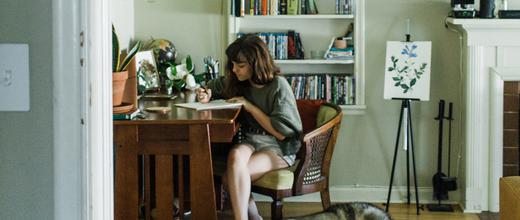The views expressed in our content reflect individual perspectives and do not represent the authoritative views of the Baha'i Faith.
The events of the world in these recent times again turn our attention to what is essential for our existence and what things are mere distractions and not necessary.
When we face a situation where we have to decide what is necessary, we are surprised to see how simple our needs are. You can listen to the stories of people who have faced death or a deadly disease and realized how wealth and possessions lose their charms and don’t matter at all.
Throughout human history, we have examples of great people like the Sufis and the followers of other religions who practiced simplicity and advocated living a simple life and avoiding the complications that excess materialism brings with it. Manifestations of God like Jesus, Mohammad, Buddha, Moses, and Baha’u’llah, the Prophet-Founder of the Baha’i Faith, exemplified simple living.
However, we also have the example of other people who were regular people like you and me — such as Gandhi, who famously said, “Live simply so that others may simply live.” They showed us how simple living is done by practicing it.
Industrialization has brought with it the ability to have things that past generations could not dream of. It has led to us accumulating things that seemed necessary, and yet, in reality, we could easily do without them. This has brought us to where we are now. When a pandemic suddenly makes us think about what is essential and what is not. It teaches us how we can do with so little. Abdu’l-Baha, the son of Baha’u’llah, wrote:
Observe how darkness has overspread the world. In every corner of the earth there is strife, discord and warfare of some kind. Mankind is submerged in the sea of materialism and occupied with the affairs of this world. They have no thought beyond earthly possessions and manifest no desire save the passions of this fleeting, mortal existence. Their utmost purpose is the attainment of material livelihood, physical comforts and worldly enjoyments such as constitute the happiness of the animal world rather than the world of man. – Abdu’l-Baha, The Promulgation of Universal Peace
Living a simple life brings peace of mind and removes some of the distractions of our life’s journey. Many studies indicate that simplicity reduces stress in life and creates a sense of freedom from the burden of unnecessary possessions.
For those of us who prefer other ways than the religious approach of denouncing material possessions, there is a movement called “voluntary simplicity.” It encourages people to live a simple life by downsizing their lives. This movement has been described as “an anti-consumerist way of life that opposes the high consumption lifestyles prevalent in consumer societies today and voluntarily embraces ’a simpler life’ of reduced consumption.”
Voluntary simplicity counters the effects of collecting possessions and believing that they are necessary for our survival. In reality, possessions often complicate our lives by making us feel dependent on them. This way of thinking has led us to forget our spiritual destiny. The Baha’i Writings tell us:
Consider to what a remarkable extent the spirituality of people has been overcome by materialism so that spiritual susceptibility seems to have vanished, divine civilization become decadent, and guidance and knowledge of God no longer remain. All are submerged in the sea of materialism. – Abdu’l-Baha, The Promulgation of Universal Peace
It should be noted that voluntary simplicity does not mean living in poverty, becoming an ascetic monk, or indiscriminately renouncing all the advantages of science and technology. It does not involve regressing to a primitive state or becoming a self-righteous puritan. And it is not some escapist fad reserved for saints, hippies, or eccentric outsiders. Instead, advocates of voluntary simplicity suggest that we examine our relationships with money, material possessions, the planet, ourselves, and each other. Voluntary simplicity is about discovering the freedom and contentment that comes with knowing how much consumption is enough.
This is a theme that has something to say to everyone, especially those in consumer cultures who are bombarded every day with thousands of cultural and institutional messages insisting that more is always better. Voluntary simplicity is a philosophy of living that advocates a counter-cultural position based on notions of sufficiency and simplicity.
Voluntary simplicity can create a sense of peace of mind and free us to spend time on the goals that matter more in life. Some of the benefits of living this way are:
Conscious Consumption
Living a simpler life isn’t just about spending less — it’s also about spending consciously. That means taking a careful look at every purchase and asking yourself whether it’s worth the money you’re spending, and the hours you’re spending to make that money.
Fewer Belongings
One side effect of consuming consciously is that you end up with fewer belongings.
Smaller Homes
Housing is the biggest expense in most families’ budgets, accounting for 26% of total spending. So it makes sense that families that want to downshift their spending often start by downsizing their homes. Choosing a small house can also simplify a family’s life by giving them less space to maintain and clean, as well as less room to accumulate more stuff.
Lower Energy Use
Another benefit of smaller homes is that they use less energy to heat and cool. By choosing to live small and cutting back on the number of electrical gadgets, people can reduce their electricity use to the point where they can power their homes with solar panels or other forms of renewable energy.
Conscious Eating
For most downshifters, living simply also means eating simply: home-cooked meals made with whole, unprocessed foods.
Shorter Work Hours
Voluntary simplicity isn’t just about spending less money. The main point for most downshifters is that, by spending less, they can afford to work less. If we reconnect with what is vital in our lives and worthy of our attention — and what is not — we can simplify our lives. That, in turn, could lead to living a less complicated existence based on solid personal principles. Those principles are what can guide us to through times of crisis without feeling any sense of panic and help us stay firmly focused on the things that matter to our individual and collective progress, both spiritually and materially.

















Comments
Sign in or create an account
Continue with Facebookor